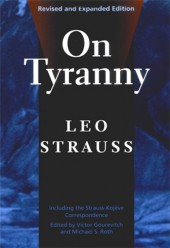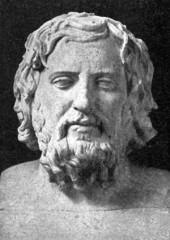 On Tyranny
On Tyranny
by Leo Strauss
Published by University of Chicago Press
Published May 15, 2000
History
358 pgs. • Find on Amazon.com
Reviewed by Stephen O. Murray
On Tyranny, the reflections on Xenophon’s Hiero by the most prominent 20th-century explicator of classic political theory, Leo Strauss (1899–1973), was first published in 1948. The most recent edition includes an English translation of Hiero plus a long review defending Stalinism by the French Hegelian (and possibly Soviet agent) Alexandre Kojève, a “restatement” by Strauss that briefly replies to a review by Eric Voegelin that systematically rebutted Kojève, and all of the correspondence between Strauss and Kojève that survives. Thus the dialogue about the advantages and disadvantages of exercising tyranny between the ancients (Xenophon and Simonides) is augmented by a three-way discussion between the moderns (Strauss, Kojève, and Voegelin, all born and educated in Europe).

There is very little in Strauss’s first text that bears any obvious relationship to 20th-century tyrannies (east or west), and my interest is more in the discourse about pederasty—which Strauss obfuscates by using “homosexuality”; to distinguish what the Greeks were discoursing about, “androphilia” would be a better label, since that term contrasts with “pedophilia”—love of adolescents rather than love of children in the ongoing “Mediterranean cultural complex” that very much includes Muslim societies.[1]The type of homosexuality that was most visible in the U.S. when Strauss wrote was organized by gender differences (butch/femme). The normative organization in ancient Greece was between an adult … Continue reading
In addition to entirely failing to distinguish “homosexuality” from pederasty, it seems to me that Strauss systematically misrepresented Hiero’s concern with the love (philia) he hopes to inspire in the eromenos (the beloved boy) from sex (eros). Hiero can easily have all the sex he wants, including from the “fairest boy,” Dailochus. What he can not get, or at least can not trust in, is the apparent “loving back” by the dependent beloved (1.33–36).
This is not much of a concern for Simonides in Xeonophon’s dialogue (or for Strauss, who consistently dismissed it as “sex,” which a “real man” should be able to do without: that is, it is effeminate to be concerned about pleasing boys or women (my gloss on a view that was common in the ancient world, especially among Romans, and is pervasive in contemporary Muslim societies, and is not unknown in postmodern societies like the USA of the third Christian millennium). “Real men” seek honor (i.e., high regard from adult males), not love or sex.
Pretending that text reveals structure and deriding historicism, Strauss did not draw on what we know about Mediterranean or Muslim cults of masculinist honor (though, admittedly, there was less to draw on in 1946 than there is now).[2]I say “did not” rather than “could not” since it seems to me that he drew on what we know of Xenophon’s biography and drew very heavily on other texts by Xenophon, Plato, and Machiavelli … Continue reading
The text does not seem to be sufficient in Strauss’s practice, since he seem to me to have interpreted some absences very heavily, and I interpret his claim “Only if read in the light of the question posed by the Hiero do the relevant portions of Xenophon’s other writings reveal their full meaning” (p. 78 ) to mean that only in light of Strauss’s understanding of Hiero can one understand other writings by Xenophon the way(s) as Strauss wants—and that Strauss considered himself free to pick and choose information from outside the text whereas no one else can.

Strauss did not castigate homosexuality/pederasty but argued that it is a stupid tyrant who is preoccupied with such unimportant pleasure (particularly that of those whose bodies are his to command), in contrast to the wise men (Simonides, Xenophon, Strauss). However, I have to grant that Strauss did link Hiero to Xenophon’s mentor (Socrates) in this regard, writing that Hiero “is concerned not so much with the pleasures of sex in general as with those of homosexuality [pederasty]. This connects him with Socrates; love of men [boys] seems to bespeak a higher aspiration than love of women” (p. 135–36n60).
In that during the 1940s “homosexuality” referred to effeminate males, I do not see why he used that term rather than pederasty (or boy-love, etc.), and I think that Xenophon admired Socrates despite what Xenophon considered Socrates’s undue interest in boys (i.e., he saw it as a flaw, but one that was overshadowed by Socrates’s many other attributes that Xenophon considered admirable).
I do not find the dialog or Strauss’s analysis helpful in understanding modern dictators or why “tyrant” is their only true “scientific” name. I can’t imagine Hitler or Stalin making Hiero’s arguments or accepting Simonides’s advice (perhaps Gorbachev might have). And what is this about the corrupt and inept Portuguese dictator Salazar being a good tyrant?
Kojève argued that modern tyranny (Stalinism) is rational, even wise, because it leads to the universal homogenous state. Many readers, including Strauss, wondering if the only thing more wretched than being a slave would be living as a contented one.
Neither Strauss nor Kojève are easy reading, although the major difficulty in reading Strauss is trying to guess what he really meant. He is revered by many neo-conservatives, but the warrant for this claim has been challenged—by his most famous student, Alan Bloom, among others.
In 2006, Yale political science professor Steven B. Smith published a major book on Strauss, Reading Leo Strauss, seeking to wrest Strauss from those who have taken warrant for neoconservative statecraft (lying to the masses, expanding executive power, and empire building—in short, what Kojève was advocating, and Strauss argued against Kojève that “if wisdom does not become common property, the mass remains in the thrall of religion,” an arrangement actively fostered by the Bush regime and its payoffs to “faith-based” contractors).
Smith, who analyzed On Tyranny at some length (with different interests than mine in the text), contends that Strauss’s politics was “liberalism without illusions” and that Strauss was someone who was deeply concerned to keep alive some awareness that there are many political arrangements (regimes) that are not and cannot be “permanent solutions.” (Despite the mystifying reference to Salazar, Strauss seems to me to have deplored totalitarianism.)
Many of Strauss’s books remain in print.
Pros: interesting questions
Cons: lack of clear answers
The Bottom Line: Difficult though interesting discourse
©2007, 2016, Stephen O. Murray
An earlier version of this review was posted on epinions, 21 Dec. 2007

